Transcript: Scoop Interviews PM Helen Clark
Scoop Election Briefing, September 13,
2005
Prime Minister Helen Clark
AUDIO: Election Briefing: Prime Minister Helen Clark
Interview by Alastair Thompson
Transcript by Rosalea Barker
Images by Kevin List
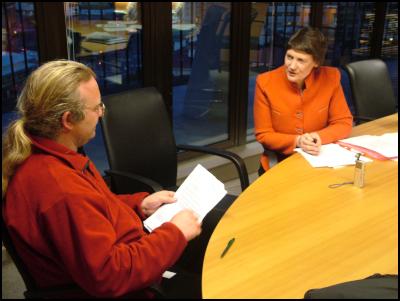
CLICK IMAGE FOR LINKS TO AUDIO
Scoop:
I'm here
with the Prime Minister for a Scoop Election Briefing. How
was your day?
Clark:
How was my day? Very full.
We've got a pretty energetic campaign out there. Very
motivated in the last week. A lot of people make up their
minds in the last week, and there's a pretty stark choice
ahead of them--a choice between a Helen Clark-led Labour
Government or a Don Brash-led Government, and people have
some big decisions to make.
Scoop:
What sort
of impressions have you been getting from around the
country?
Clark:
Well, from the point of view of
Labour on the ground, the feel is exactly the same as 1999,
2002 because our vote is holding. The question is: What's
happening to other people's votes? The Greens seem to have
secured their place. They've 5 percent. The right-wing vote
has largely collapsed in around National. That's the big
difference this time. The last election was rather finely
poised between Labour and natural allies, and National and
natural allies. The difference was that National collapsed
around the 21 percent, giving room for New Zealand First to
go up to double figures, ACT to about 6, and United Future
to somewhere around 6 as well. So when you put all that
together, you had 63 seats for Labour-Progressive-Greens and
57 for National and allies. That was a close election even
though it might not have seemed so because of National's
huge weakness.
Scoop:
From the perspective at
Scoop, this seems to be a very intense campaign. You get the
impression there's a lot of public feeling out there as if
this is a critical juncture in New Zealand's future. Do you
have a few clues as to why that's the case?
Clark:
I think it is a critical juncture because Don Brash
represents the last gasp of the Rogernomics Ruthanasia era.
He was there up to his elbows in it, continues to support
everything that was done, holus bolus. It's clear that he
would flick a switch and take us back to the kind of
thinking that prevailed at that time. You see it as the
policies are rolled out. Market rents for State houses:
anyone who's studied the social impact of that knows it was
absolutely disastrous. But he brazenly puts it out there as
though nothing is wrong.
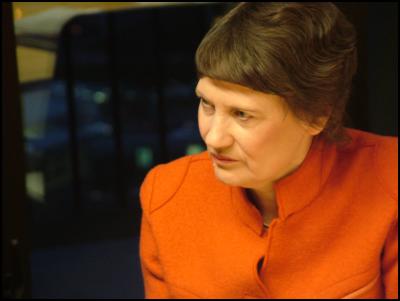
Click for big version
You see it with the ACC policy. National eventually got around to opening up the ACC for privatisation. Probably what they now see as a mistake is they let the ACC continue with a corporation to compete for the business, and it was doing rather well, which the insurance companies didn't like. So this time they put the policy out there, in effect implying that there be no public insurer in that area except for the residual claims, and the private insurers will get the whole $2 billion market of levies that presently goes to ACC.
So I think it's a critical election because they want to flick the switch and take us back to the unmitigated neo-liberalism of the past, when we've spent six years trying to reverse out of that cul de sac and take another path. And I think, successfully take another path. If we look at what is happening with child poverty rates dropping off, if we look at economic growth, if we look at the lowest unemployment in the Western world. If we look at so many indicators, New Zealand's on the move and successfully. And that contrasts with some pretty bleak years in the recent past.
Scoop:
Back to the
campaign, from a campaign organisational perspective,
there's been a lot of talk of dirty tricks on the campaign
trail. And the pamphlets have only been a small part of that
really. There's the push polling allegations that we've just
seen, and then there's overseas political consultants about.
It looks like there's a great deal more money spent on this
campaign than any campaign in recent history. I also think
there's been a lot more message management under way, in
terms of control of who gets interviewed and how. Are we
seeing a bit of an Americanisation of New Zealand
politics?
Clark:
Yes, I believe we are seeing
an Americanisation of our politics. I think we're seeing how
closely these right-wing parties in the Anglo-Saxon
countries, if you like, are networking. Lynton Crosby, big
adviser to the Aussie Liberal Party was off in the UK
tutoring Michael Howard's Conservative Party. The Exclusive
Brethren network across the US, Australia, and New Zealand.
We're seeing the sort of techniques, the so-called
dogwhistle, the wedge politics, the smear tactics, the very,
very big money. There's huge money behind this National
Party campaign. Big business, weird cults like Exclusive
Brethren, all making this a New Zealand election that's very
different from any I've ever known.
Scoop:
Why
do you think they care?
Clark:
I think they
hate Labour Parties. I think they're bringing the same sort
of hate that was brought by the Republicans and their
networks against John Kerry and the Democrats. And it is a
disturbing trend.
Scoop:
Another aspect of this
campaign has been the use of wedge politics by a major
political party, the National Party, which is something that
we've been more used to seeing from Winston Peters in the
past. And perhaps with Winston, we've never really taken
them all that seriously. Do you have a view on the use of
this sort of political strategy?
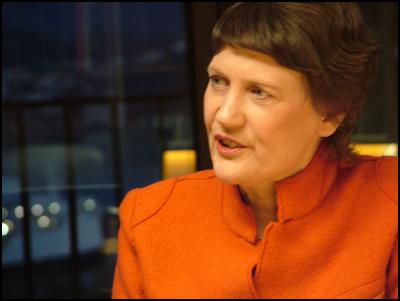
Click for big version
Clark:
The
divide-and-rule strategy is not a new one for the National
Party. Muldoon practised it to perfection, dividing people
into "ins" and "outs"--those he accommodated; those he
didn't. Brash has brought his own style to that. He
practises very exclusive politics. Of course, when he's
asked specifically who's in the mainstream and who isn't, he
refuses to say. I think one of the funniest commentaries on
that was a cartoon which had the aid in the office taking a
phone call and saying, "Excuse me, Dr Brash. There's someone
on the phone who wants to know whether she's mainstream or
not." And he replies, "Who is it?" And the aid says, "It's
your wife from Singapore."
I mean, what is this "mainstream" supposed to mean? The National Party has gay candidates. The National Party has Maori candidates. The National Party has an Asian candidate. Excuse me? Who is it that's not mainstream? Or is this just totally dishonest dogwhistle politics to try and divide people against each other?
Scoop:
Peter Dunne came out today with a
call for the National Party to reconsider its approach to
the Maori seats. Do you have a message for the National
Party Leader on that subject?
Clark:
I've been
saying ever since Dr Brash floated his policy of abolishing
the Maori seats, that I believed it would cause grave
disharmony in New Zealand if a Parliament made up largely of
people who are not Maori took that choice--which is
presently enshrined in law--away from Maori. I think it
would be seen as a very vicious act against Maoridom. After
all, these seats go back to the mid-nineteenth century. They
have a long history. And to just get rid of them against
Maori opinion, I think, would be very damaging.
Scoop:
When he came up with his second speech,
he talked about the soufflé won't rise twice, or he didn't
expect it to rise twice, and there was some debate about
whether it did, partly because the polls are
so--
Clark:
Messy.
Scoop:
--messy.
I got the impression at that time that perhaps the Labour
Party was a little reluctant to make the case for making
race relations much of an issue in the
election.
Clark:
I don't think it's good for
race relations for it to be a central issue in the election.
Fundamentally, New Zealanders are fair-minded. You had the
speech, Orewa-1, and it worked its way through the system.
But to have race relations now at the centre of the
campaign, I think would be quite damaging to New Zealand.
And I don't actually think he got the traction on that
second speech that he wanted.
Scoop:
This is
now the fourth MMP election, all of which you've
participated in as--
Clark:
Been Leader of the
Labour Party in.
Scoop:
--Leader of the Labour
Party. Do you think the majority of political parties are
now a bit more familiar now with how the system
works?
Clark:
I think most are, but the
National Party clearly has the strategy of trying to win an
outright majority. What we discovered last time was, if
there was any prospect of that, the electorate reacted quite
adversely because it provoked memories of governments having
unrestrained power under the first-past-the-post era. So, I
think it's a flawed strategy to go for an outright majority.
That's why we've been very clear from the beginning that we
seek to govern in concert with others, and we stated our
preferences for who we would work with, which are those
parties we've been able to work with on a cooperative and
constructive basis for the past three years.
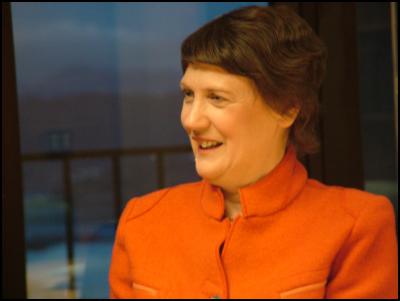
Click for big version
The National Party, on the other hand, has started systematically trying to demolish anyone who might give it a hand-up in government. The prospect now of being able to have any sort of stable NZ First-National Government after an extremely bitter campaign in Tauranga would have to be somewhat remote. So that invokes memories of the disaster of the Shipley-Peters combination back in the late '90s, and Dr Brash is Jenny Shipley with bells on when it comes to being far right.
Scoop:
In relation to Winston Peters, he
seems to be trying to turn the election now into a two-horse
race, at the end of which he gets to crown the winner. The
way this stance can be seen is as pushing Green voters to
vote for Labour, which is a sort of unusual consequence of
his position. Do you think this is a positive or negative
development?
Clark:
I think there's two points
there. His trying to position himself as the kingmaker of
the two /// has played very, very badly for him, and his
polling started to fall off after that. Secondly, there is a
bit of interplay between the Labour and Green vote. If
people think that Labour might not be the largest party,
they tend to come back in behind Labour. Conversely, they
don't want to come so much in behind they put Greens under
the threshold. So there's certainly some interaction with
voters there, sort of thinking through the strategic
consequences.
Scoop:
It puts them in a very
difficult position.
Clark:
It does. It does.
And fundamentally, it's important to Labour that the Greens
are on 5 percent, because they are a natural partner to work
with in government.
Scoop:
Do you think that
Winston was serious about just backing the party with the
most votes, regardless?
Clark:
I think their
statements have been quite ambiguous. He seems to have
backed off any idea of being part of the government. But
it's hard to see how--with this Tauranga campaign having
been so bitter--that he could sustain a Brash-led
government.
Scoop:
Looking away from the
campaign for a moment, assuming you are elected, what
besides the policy announcements--which are in the
manifesto--will you be treating as a priority in the coming
term?
Clark:
I think one of the disappointments
of an election campaign like this is that it's very
difficult to get up the big issues about the future of New
Zealand--like the direction the economy's taken. We've had a
very strategic approach to the economy. How does the
Government add value to economic development and
modernisation? I believe we've done a tremendous amount to
sort of cajole, encourage, work alongside regions,
industries, businesses, to push more sophistication in
production of goods and services, more skills, more
productivity, more R&D, more innovation, smarter branding,
more adventurous marketing looking offshore.
And that's made a huge difference to the NZ economy. We're in a position at the moment where previously the economy would have wilted with this level of exchange rate. But the New Zealand economy has continued to do quite well, and I think it's because rather more of it has managed to position at a level of the international market where we can command a price rather than just having to take it.
Scoop:
So you're basically saying we've got a very resilient
economy now?
Clark:
I'm saying that there's
more resilience in the economy, more strength. Now, you've
always got to build on that, and if you ever stand still,
then others up and overtake you. So it has to be a continual
process of transformation. That's the strategic approach
that we've brought.
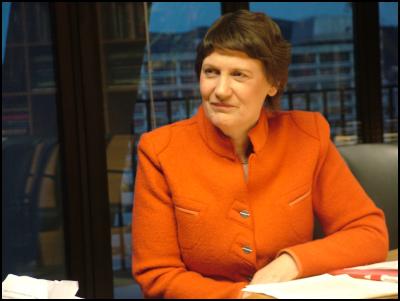
Click for big version
Scoop:
Are there
other things, though, that you'd like to see that you
haven't been able to deal with, thus far in the six years
that you've been in government?
Clark:
As I
say, your work is never done. So it's never done on the
economy. You just have to keep innovating and adapting the
policies. In the health area, we've had to overcome years of
underinvestment, and we've invested a lot of money. I think
in the next term, we'll be looking for more productivity
improvements out the other end. But when you're running to
catch up--whether it's in nurses' salaries or capital
investment--then your time is very much focused on
increasing volume and putting the money in to do that. I
think we should now look to productivity improvements as
well.
Obviously, the next term there'll be a very big focus on better value for money in the tertiary spend because there's some things got away there and shouldn't have. We're working very rapidly to address that. The foreign policy and trade agenda is pretty big, too. Huge developments with the East Asian Summit and the sort of relationships that we're building--and Australia's also building--with East Asia as the most dynamic region in the world today. So plenty of projects for the third term.
Scoop:
One area that's sort of in some ways
might have been left behind a bit in the last six years, is
social work and Child, Youth and Family. I know that some
monies have been put into it, but we clearly still have a
lot of problems with child poverty and child abuse. Is that
something that you would see getting more
attention?
Clark:
First, /// child poverty. The
full implementation of Working Families by 1 April,
2007--
Scoop:
I'm caring more about the
ambulance, as opposed to the--
Clark:
The full
implementation drops child poverty by 30 percent, and that
will put the rate of child poverty at around the same level
as the Netherlands, which people would think was a pretty
amazing achievement. And lower than the EU average for child
poverty. So that's a positive.
On the Child, Youth and Family, child abuse and neglect side, yes, that *is* an issue. It *is* an issue. And it's not an easily solved issue. I think that the falling of so many families off the cliff has been influenced by what happened to New Zealand in the bad years. When you drive people over a cliff and off the edge, and drive the development of an underclass--as happened--you will see the results of that. And we have. Now, Child, Youth and Family struggled with that. It struggled with leadership. It struggled with resourcing.

Click for big version
Scoop:
They're
still struggling, really.
Clark:
Well, what we
can show is that the number of unallocated cases is down
from 4,592 in May last year, to 993 on 1 July this year. So
there's been a huge campaign within CYF to get that down.
Scoop:
You probably know a few people who have
dealt with Children, Young Persons and their Family Service
and certainly from my anecdotal experience, they don't seem
to really be in a position to help people in their
difficulties. It's more sort of wrap-em-up bandaging and
hopefully you'll get better of your own
accord.
Clark:
I think CYF is positioned very
much towards the bottom of the cliff, and often right at the
bottom of the cliff. I think the further up the cliff--and
hopefully the top of the cliff--has to come through the
Strengthening Families-type initiatives. And I think a lot
has been done in that area, but we are overcoming the
impacts of a generation or two having been pretty battered.
We experience the impact of that in regions where there've
been very high unemployment, and where getting people back
to work was actually quite a major rehab job, because there
were many people who had simply become--with second- or
third-generation unemployment--too alcoholic,
drug-dependent, overweight and just plain sick to work. Now,
if you then say, "Well, what kind of families come from
that?", it isn't good. I think we've got long-term repair
work to do there, none of which is helped by a return to the
excesses of neo-liberalism.
Scoop:
One of the
big challenges ahead is the issue of Peak Oil, that's come
up. For the first time, in this election campaign, so far as
I'm aware. Is this one of the big challenges for New
Zealand?
Clark:
Yeah. Big, big challenges to
all Western economies and all fast-developing emerging
economies like China and India. And, of course, the pressure
that they put on the international market is one of the
reasons for the incredible prices of oil at the moment. I
mean, we've had the triple whammy: you've got the huge
instability in the Middle East, exacerbated by the war in
Iraq, and you've got the instability in Venezuela; you've
got the growth of the mega-population economies like China
and India, and also the renewed growth in the States has put
pressure on oil prices as well; and then you had Hurricane
Katrina come along and affect the refining capacity in the
States. Put the three together--up go the prices. Now, the
US refining capacity, obviously, is increasing as we speak,
and that's enabled prices to come off peak. But longer-term,
everyone knows we're beyond the cheap oil era. Oil will be
dear.
Scoop:
The Ministry of Economic
Development didn't seem to be aware of that a year or so
ago.
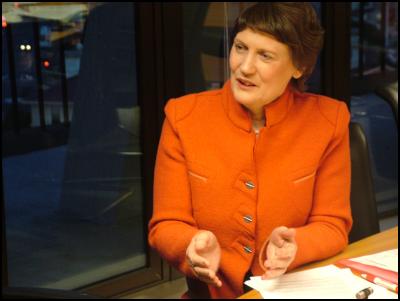
Click for big version
Clark:
No,
well--if they're not aware now, there's a radical problem.
That's why we've been talking about how can New Zealand be
at the forefront of environmental technologies. How can we
adapt more biofuels? How fast can the technology for the
hybrid and less oil-dependent cars be here? What policy
framework do we need to deal with this?
Scoop:
So you're looking forward to dealing with
that?
Clark:
I always love to deal with the
challenges, and it's a big one. Not just for
us.
Scoop:
Why is it important that New Zealand
lead the regionalisation of the Pacific Plan, and what can
be expected out of that?
Clark:
In the 21st
century, small, vulnerable nations stand to fall further and
further behind if they're not somehow linked and holding
hands together, to work out smart strategies for economic
and social development. Small island economies with growing
tourism stand to be radically affected by HIV/Aids if there
aren't the smart strategies. They stand to lose the best and
brightest to countries like New Zealand in the first
instance, and also Australia. They stand to be further
marginalised, and that's the urgency we've seen for moving
on the Pacific Plan. To see how we can work more
cooperatively to stop our neighbours in the Pacific simply
failing in every sense--economically, in health terms,
socially--and not being viable.
Scoop:
On the
security issue, Papua New Guinea courts recently ruled that
immunity for the peacekeepers and the police force that were
there from the Australians would be removed, and Australia
then pulled out the peacekeepers. MFAT's been in talks with
its Australian counterpart to ascertain what this means for
New Zealand. What can we distilled from that, do you think,
as far as we're concerned?
Clark:
Firstly, we
tend not to put in-line positions into other countries. I
think if you're putting in-line positions in, it's very
important to be invited, and to establish the terms for
that. We do have in-line positions in Nuie at Nuie's
request, but more generally, our police positions are
support-and-train positions, or mentor-and-adviser
positions.
Scoop:
Rather than ///
investigation.
Clark:
Yes. "In-line" in the
Australian sense in PNG was going in and actually doing the
duties of the police force. Of course, to some extent,
that's been the case in the Solomons, but then the Solomons
Government wanted that kind of support. But if you're going
to provide in-line support, then it's very important that
you be invited and that there be a clear understanding about
the conditions.
Scoop:
Looking back over the
past six years, what are you most pleased about having
achieved?
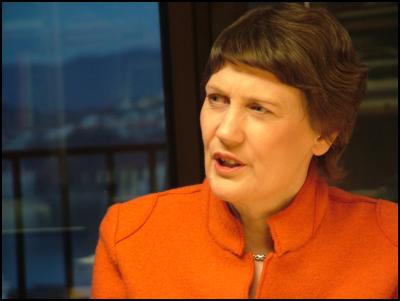
Click for big version
Clark:
Halving
unemployment. I think that's been a huge achievement, and I
don't think anybody thought it was possible. Except us. I
remember doing an interview--I think it was a debate with
Jenny Shipley which Al Morrison moderated--and I was asked
what difference I thought a Labour Government could make to
unemployment. And I said, I believe that over time we could
it down well below its 6 percent-plus it hovered around. And
when asked what level I thought we'd get it down to, I said
I thought that somewhere between 3 and 4 percent was
generally regarded as the clearance level for unemployment
in Western economies and that's where we should aim. I was
scoffed at. People said, "How ridiculous! You'll never
achieve that." Well, we have achieved it, and I think that's
been a fantastic achievement.
Scoop:
What will
you be doing in the final days of the campaign? Michael
Cullen said that he's only got two sleeves and he's already
pulled out both his ///
Clark:
I don't think
the last week is a time for major new policy announcements.
We are still issuing policies, but they don't involve major
spending. I think it's too late for that. I think the
cynical move on the petrol levy earlier this week is just
something that a responsible party can't credibly do. It
looks desperate.
Our campaign this week is really about driving home key messages. That if you want a Helen Clark-led government, you need to vote for it, and not vote for parties which aren't committed to that outcome. If you vote for parties that are committed to sitting on the fence, then you can wake up with an awful hangover the day after the election, and find you've got a government you didn't want at all. So we're moving across all age groups, and across the society, in the last few days, and campaigning very energetically.
Scoop:
This election is
obviously coming down to the wire. Are you just a little bit
nervous about what might happen in the next four
days?
Clark:
You have to put your fate in the
hands of New Zealanders. You have to say the voters will
make the decision that they believe is best for New Zealand,
and we can only got out there and put our best foot forward,
talk about what we believe we've achieved and how we can
build on that. In the end, people have the right to choose.
And they will.
Scoop:
Thank you Helen
Clark.
Clark:
Thank you.
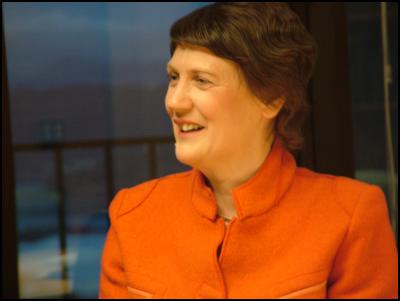
Click for big version


 Richard S. Ehrlich: Deadly Border Feud Between Thailand & Cambodia
Richard S. Ehrlich: Deadly Border Feud Between Thailand & Cambodia Gordon Campbell: On Free Speech And Anti-Semitism
Gordon Campbell: On Free Speech And Anti-Semitism Ian Powell: The Disgrace Of The Hospice Care Funding Scandal
Ian Powell: The Disgrace Of The Hospice Care Funding Scandal Binoy Kampmark: Catching Israel Out - Gaza And The Madleen “Selfie” Protest
Binoy Kampmark: Catching Israel Out - Gaza And The Madleen “Selfie” Protest Ramzy Baroud: Gaza's 'Humanitarian' Façade - A Deceptive Ploy Unravels
Ramzy Baroud: Gaza's 'Humanitarian' Façade - A Deceptive Ploy Unravels Keith Rankin: Remembering New Zealand's Missing Tragedy
Keith Rankin: Remembering New Zealand's Missing Tragedy